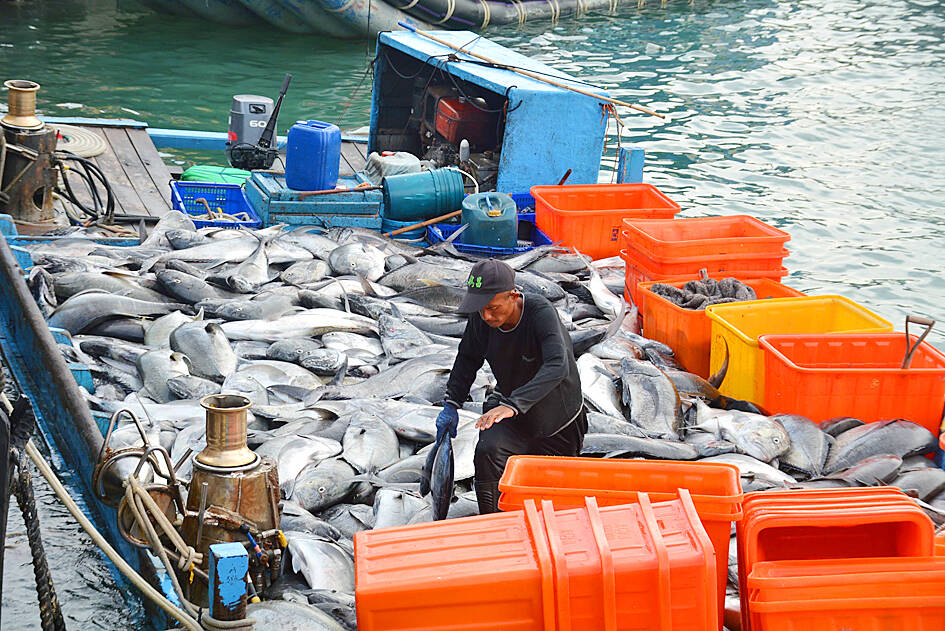Two years after the government approved an Action Plan for Fisheries and Human Rights, efforts to ensure the basic rights of migrant fishers are still inadequate, civic groups told a news conference on Wednesday, urging the authorities to address problems in the distant-water fishing sector.
The Cabinet on May 20, 2022, approved a three-year plan to improve the rights of fishing crew, onboard facilities and onshore facilities.
An alliance of civic groups concerned with the basic rights of migrant fishers presented a mid-term review of the plan, saying that Taiwan has done badly in fulfilling labor standards, improving living conditions and social security, and improving management and monitoring of shipowners.

Photo courtesy of Lin Yu-kai via CNA
Taiwan received a rating of one out of three stars in each category.
Greenpeace ocean campaigner Yuton Lee (李于彤) cited the lack of Internet access on most Taiwanese fishing vessels, which has rendered channels set up by the Fisheries Agency for migrant distant-water fishers to file complaints over potential infringements of their rights obsolete.
So far, only 98 out of more than 1,000 Taiwanese distant-water fishing vessels, or less than 10 percent, have had Wi-Fi installed, Lee added.
The Fisheries Agency recently drafted guidelines regarding Wi-Fi use on distant-water fishing vessels, which recommended allowing crew members “at least 40MB or three hours of data use each month,” said Taiwan Association for Human Rights senior researcher Shih Yi-hsiang (施逸翔), which he called “grossly insufficient.”
Lennon Wong (汪英達), director of migrant worker policies at the Serve the People Association in Taoyuan, said the agency had drawn up “terrible” guidelines by working with representatives from the seafood industry while ignoring suggestions proposed by civic groups.
Other issues that contributed to the scathing scores included delayed salary payments, excessive working hours and failure to incorporate the C188 Work in Fishing Convention (C188) adopted by the International Labour Organization (ILO) into domestic law, the groups said.
The groups also cited “pre-planned” interviews of migrant distant-water fishers and poor interpretation quality that compromises the ability to assess migrant fishers’ working conditions.
The US and the EU are major markets for Taiwan’s distant-water fishing sector, and both place great emphasis on human rights, Lee said.
Taiwan’s distant-water fishing industry is therefore in pressing need of reform if it is to retain its global competitiveness, she said.
With the inauguration of President William Lai (賴清德), the new administration should identify ways to improve or enforce the action plan, she added.
The Fisheries Agency said in a statement that the guidelines on migrant fishers’ Wi-Fi use have not been finalized and that a final version would be published at a later date.
Interviews conducted by the agency follow a standard procedure and use standardized survey questions to ascertain whether migrant fishers have been subjected to mistreatment, it said.
The agency uses a questionnaire titled “assessment of possible exploitation of foreign crew members” created by the Ministry of the Interior to determine whether there is forced labor on Taiwanese-flagged fishing vessels, it added.
A draft bill to adopt the ILO-C188 is expected to be delivered to the Cabinet for review this year before it is deliberated by the legislature, it added.

Taiwan is to commence mass production of the Tien Kung (天弓, “Sky Bow”) III, IV and V missiles by the second quarter of this year if the legislature approves the government’s NT$1.25 trillion (US$39.78 billion) special defense budget, an official said yesterday. Commenting on condition of anonymity, a defense official with knowledge of the matter said that the advanced systems are expected to provide crucial capabilities against ballistic and cruise missiles for the proposed “T-Dome,” an advanced, multi-layered air defense network. The Tien Kung III is an air defense missile with a maximum interception altitude of 35km. The Tien Kung IV and V

The disruption of 941 flights in and out of Taiwan due to China’s large-scale military exercises was no accident, but rather the result of a “quasi-blockade” used to simulate creating the air and sea routes needed for an amphibious landing, a military expert said. The disruptions occurred on Tuesday and lasted about 10 hours as China conducted live-fire drills in the Taiwan Strait. The Civil Aviation Administration (CAA) said the exercises affected 857 international flights and 84 domestic flights, affecting more than 100,000 travelers. Su Tzu-yun (蘇紫雲), a research fellow at the government-sponsored Institute for National Defense and Security Research, said the air

Taiwan lacks effective and cost-efficient armaments to intercept rockets, making the planned “T-Dome” interception system necessary, two experts said on Tuesday. The concerns were raised after China’s military fired two waves of rockets during live-fire drills around Taiwan on Tuesday, part of two-day exercises code-named “Justice Mission 2025.” The first wave involved 17 rockets launched at 9am from Pingtan in China’s Fujian Province, according to Lieutenant General Hsieh Jih-sheng (謝日升) of the Office of the Deputy Chief of the General Staff for Intelligence at the Ministry of National Defense. Those rockets landed 70 nautical miles (129.6km) northeast of Keelung without flying over Taiwan,

A strong continental cold air mass is to bring pollutants to Taiwan from tomorrow, the Ministry of Environment said today, as it issued an “orange” air quality alert for most of the country. All of Taiwan except for Hualien and Taitung counties is to be under an “orange” air quality alert tomorrow, indicating air quality that is unhealthy for sensitive groups. In China, areas from Shandong to Shanghai have been enveloped in haze since Saturday, the ministry said in a news release. Yesterday, hourly concentrations of PM2.5 in these areas ranged from 65 to 160 micrograms per cubic meter (mg/m³), and pollutants were